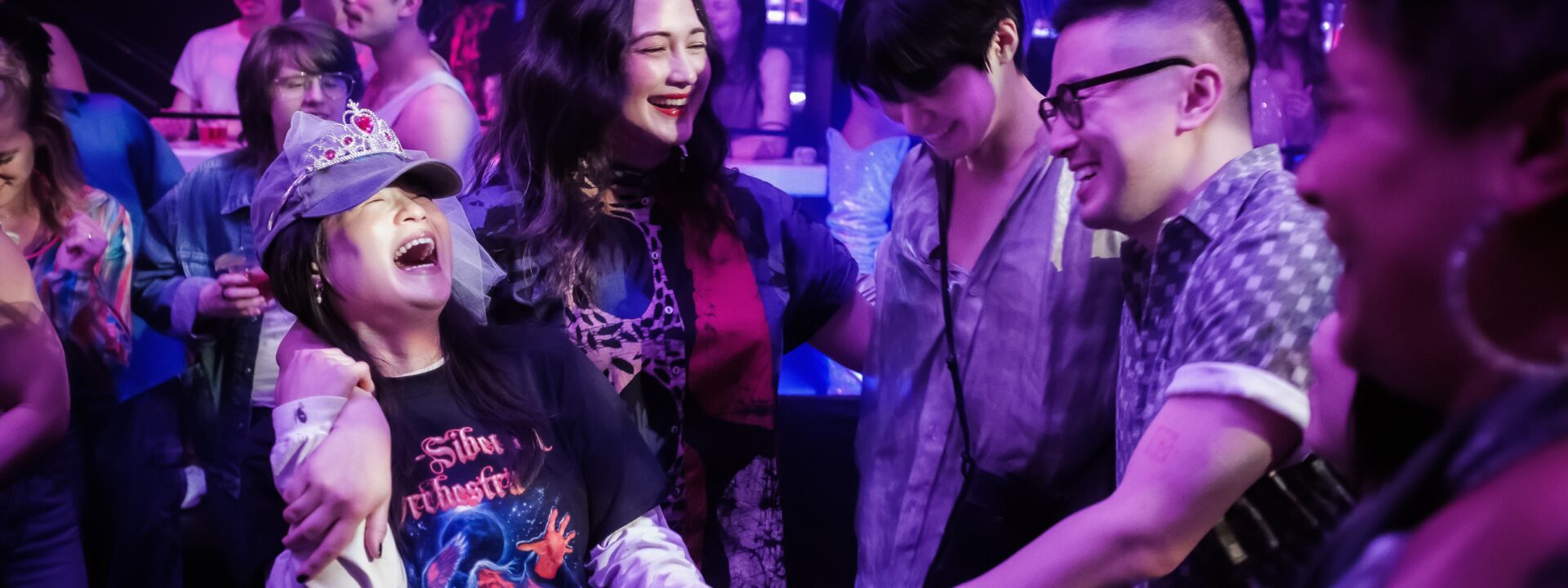In 1993, director Ang Lee (known for Sense and Sensibility, Brokeback Mountain, and Life of Pi) had his first major breakthrough with The Wedding Banquet, a romantic comedy about a marriage of convenience between a partially closeted Taiwanese immigrant and his female tenant seeking a green card. Now, over 30 years later, Lee’s queer comedy of errors has been reimagined by Andrew Ahn, director of Fire Island, who transformed the pre-marriage-equality story into a timely and charming film starring Lily Gladstone, Bowen Yang, Kelly Marie Tran, and Han Gi-chan.
Ahn’s version of The Wedding Banquet follows a tight-knit group of Seattle roommates—couples Lee (Gladstone) and Angela (Tran), and Chris (Yang) and Min (Han)—who devise a plan for a sham marriage that benefits them all. In exchange for helping Min, the heir to a Korean fashion empire, stay in the U.S. while Chris grapples with commitment issues, Angela (the bride-to-be) and her partner Lee will receive funding for another round of IVF. But complications arise when Min’s grandmother (Youn Yuh-Jung) arrives from Korea to oversee the wedding.
The result is a film that humorously and tenderly explores the bonds of chosen family, brought to life by a cast that formed their own serendipitous connection. “I met Andrew in person the morning after the Golden Globes,” Gladstone tells Vogue. “I told him, ‘I love the script and your other films, but the biggest sign for me to take this role was knowing Bowen was playing Chris.'”
Gladstone—who made history with her best actress win at last year’s Globes for Killers of the Flower Moon—says she felt a spiritual link to Yang long before joining the film. Growing up on Montana’s Blackfeet Nation reservation, she knew her mother had miscarried a few months before conceiving her. As a child, she often wondered about the brother she never met, named August. Then, while watching Saturday Night Live with her mom, they saw Yang join the cast. “My mom said, ‘That’s him! That’s who he would have been,'” Gladstone recalls.
By 2024, Gladstone—known for playing strong, stoic women in films like Fancy Dance, Under the Bridge, and Killers of the Flower Moon—was approached by Ahn to play Lee in The Wedding Banquet. Despite initial hesitations, including stepping into comedy and portraying her character’s IVF journey, she couldn’t pass up the chance to work with Yang, who had already signed on as Chris, Angela’s codependent best friend.
“I was looking for something lighter anyway,” Gladstone says. “This script had romance and comedy, but it was grounded in real, meaningful dynamics.” She adds, “I wanted to give my mom the gift of seeing her daughter and her ‘son’ onscreen together.” (She affectionately calls Yang her “star brother.”)
If the idea of the universe reuniting her with a long-lost brother on set seems unlikely, Gladstone believes every meaningful film she’s worked on has had “little supernatural signs.”
“Some films have their own spirit—the ones that need to be made, that have their own life—and they bring people together at the right time,” she says. “Those are the films where you get perfect weather on a day that was supposed to be stormy. There are always these little signs.”
Yang, meanwhile, didn’t expect to form such a cosmic bond when he reunited with Ahn after starring in Fire Island (2022). But the comedian admits he’s still “floored” by the experience.
(Photo: Bleecker Street/ShivHans Pictures)Here’s the rewritten text in clear and natural English:
—
Yang was moved by Gladstone’s story and the forces that brought them together. “It’s one of the most incredible things I’ve ever heard about myself,” Yang says, turning to his costar. “It’s one of those things where there’s some sort of—what did you call it? ‘Metaphysical will’?”
While their bond felt uniquely fated, Gladstone and Yang say they weren’t the only cast members who connected while making The Wedding Banquet. From the actors’ shared protectiveness over Han, who was taking on his first English-language role, to the maternal warmth from Youn (Minari) and Joan Chen (The Last Emperor), who plays Angela’s overeager mother, all kinds of familial bonds seemed to form during filming.
This was exactly what Ahn had intended. The filmmaker skipped chemistry reads and rehearsals, trusting his instinct that the cast would naturally connect. He also encouraged them to develop deep backstories for their characters, letting those histories shape their onscreen relationships. “When we dove into the scenes, there was this immediate delight—and recognition—seeing what each actor brought,” says Gladstone, who suggested making her character, Lee, a member of Seattle’s Duwamish tribe to reflect her focus on legacy.
The film’s emphasis on found family also resonated deeply. “Where I come from, it’s natural to have aunties and uncles around and to embrace them as other parents,” Gladstone says. “In our languages, there’s no word for ‘auntie’—it’s ‘little mother.’ What I love about this film is that it shows how impossible it is to raise a family without friends and community.”
Her costar—who sees himself as a found sibling—agrees. “This movie is about four people who truly need each other,” Yang says. “They know each other so well and, as Gi-chan says, love each other too hard. That’s the root of their problems. It’s not a huge leap to say, ‘We’re raising a child together.’ The only way I’d ever consider raising a kid is if I had my friends’ help. That’s the only scenario where it would make sense to me.”
—
Let me know if you’d like any further refinements!
